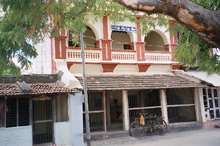Subramaniya Bharati
Subramaniya Bharati (actually C. Subramaniya Aiyar ; Tamil : சுப்ரமணிய பாரதி, Cupramaṇiya Pārati ; born December 11, 1882 in Ettayapuram ; † September 11, 1921 in Madras ) was a Tamil poet, essayist, journalist, editor, freedom fighter and reformer. He expressed his national feeling in simple, folk-oriented poetry and was nicknamed Mahakavi Bharathiyar ( Mahakavi means "great poet").
Life
Subramaniya Bharati came from a brahmin family from Ettayapuram , a small town in what is now the Thoothukudi district in the south of the state of Tamil Nadu . Ettayapuram was the seat of a local ruling dynasty who had been appointed by the British as zamindars (landlords). His father Chinnasami Aiyar was an official in the court of the Raja of Ettayapuram. In 1889 his mother died. Subramaniya was already engaged in music and poetry in childhood. At the age of 11, the poetry court gave him the honorary title "Bharati" (equivalent to the goddess Sarasvati ) in recognition of his talent , which he later kept as a nickname. From 1894 to 1897 he went to school in Tirunelveli .
In 1897, Subramaniya Bharati married his then seven-year-old cousin Chellamma. The following year his father died and he went to Benares , where he learned Sanskrit and Hindi . In 1902 he returned to Ettayapuram as court poet of the local Rajas. But he seemed to have hated the job, and after two years he gave it up again. He later processed his experiences in the unfinished satire Chinna Sankaran Kathai (1913, "The Story of Little Sankaran"), in which he targeted the anachronism of feudal court life and the creeping of court poets. After a brief interlude as a Tamil teacher in Madurai , Bharati went to Madras , where he worked as a journalist for the Tamil daily newspaper Swadesamitran .
From 1905, Subramaniya Bharati was also interested in politics. He met with the nationalist politicians VO Chidambaram Pillai , Bal Gangadhar Tilak , Aurobindo Ghose and Lala Lajpat Rai and attended sessions of the Indian National Congress . In 1907 he became editor of the radical magazines Indiya and Bala Bharatam and advocated reforms and the independence of India. His first collection of poems, Swadesa Gitangal (“National Songs”), he published in Madras in 1908, including the nationalist poems Vande Mataram , Entayum Tayum and Jaya Bharat . To avoid arrest for his nationalist writings, Subramania Bharati fled to Pondicherry , France , in 1908 , where he spent ten years in political exile. There he continued to publish Indiya and, from 1909, another magazine, Vijaya . Both magazines had to be discontinued in 1910 because the British colonial government had banned their distribution in British India. In the same year Aurobindo Ghose and VVS Aiyar also came into exile in Pondicherry to avoid political persecution by the British like Subramaniya. They became political companions during this period.
Subramaniya Bharati wrote his most famous works Panchali Sabatham (1912) and Kannan Pattu (1917, "Singing about Krishna ") in Pondicherry . With the satire The Fox with the Golden Tail (1914) he attacked theosophy and Hindu reforms and praised the October Revolution with the poem Puthiya Rusiya (1917, "The New Russia") . He also wrote political and other essays and wrote numerous songs and carnatic music ( kritis ).
In November 1918 he returned to India and was immediately arrested by the British in Cuddalore , but released after just under a month. After his release from prison, he lived in poor conditions with his in-laws in the village of Kadayam . The penniless Bharati tried in vain for a job as court poet in Ettayapuram. In 1920 he accepted a position as editor of Swadesimitran in Madras. In Madras he met Gandhi at Rajagopalachari and became his follower. He spent the last few years in a house in the Triplicane district . Subramaiya Bharati died on September 12, 1921 at the age of 38.
Subramaniya Bharatis started a new era in Tamil literature. He introduced a new style of Tamil poetry in which he broke the prevailing syntactic rules handed down from the Tolkappiyam and used a poetic style of prose called puthukkavitai ("new poetry").
The Bharathiar University in Coimbatore was named after him.
literature
- Helga Anton: The ideological-artistic development of C. Subramanya Bharatis , Berlin 1967 (dissertation)
- Helga Anton: Subramanya Bharati: a representation of his ideological and artistic development , Madras 1977
- AR Venkatachalapathy: The Province of the Book. Scholars, Scribes, and Scribblers in Colonial Tamilnadu. Ranikhet: Permanent Black, 2012. pp. 51-64.
Individual evidence
Web links
- Biography in key points
- Subramania Bharati's Letters: a treasure trove in The Hindu, April 6, 2008
- List of works
- biography
- biography
| personal data | |
|---|---|
| SURNAME | Subramaniya Bharati |
| ALTERNATIVE NAMES | Subramaniya Aiyar, C .; Subramaniyam Bharati; Pāratiyar |
| BRIEF DESCRIPTION | Tamil poet, essayist, freedom fighter and reformer |
| BIRTH DATE | December 11, 1882 |
| PLACE OF BIRTH | Ettayapuram |
| DATE OF DEATH | September 11, 1921 |
| PLACE OF DEATH | Madras |


